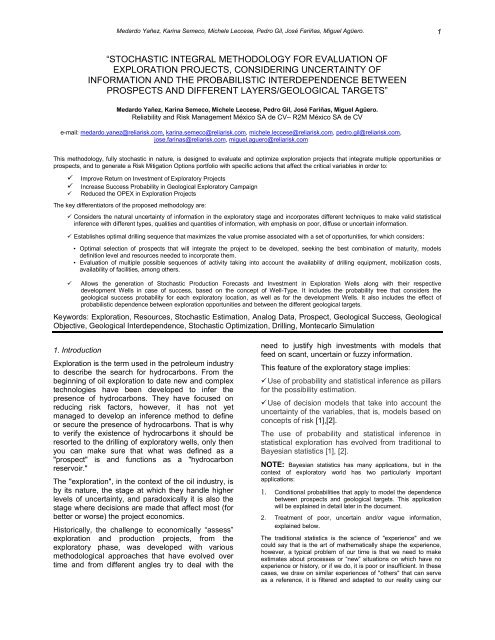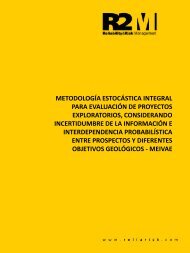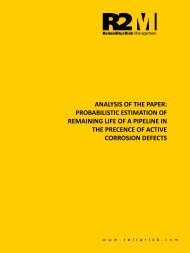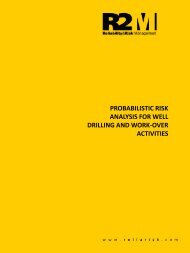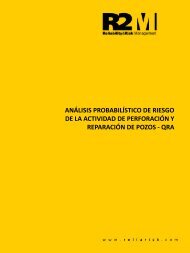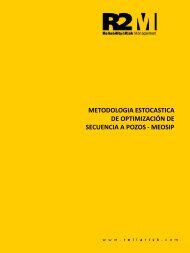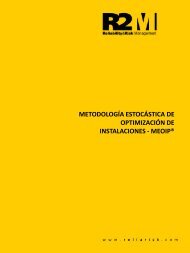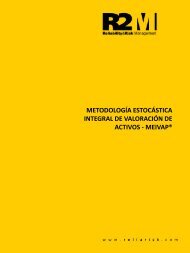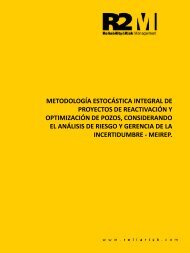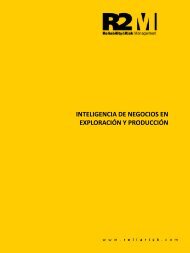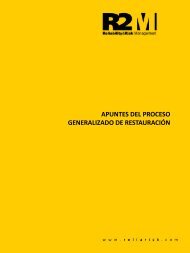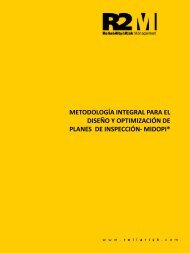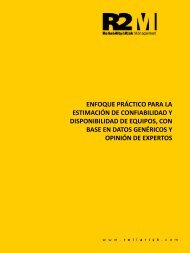Stochastic Evaluation of Exploration Assets - MEIVAE
You also want an ePaper? Increase the reach of your titles
YUMPU automatically turns print PDFs into web optimized ePapers that Google loves.
Medardo Yañez, Karina Semeco, Michele Leccese, Pedro Gil, José Fariñas, Miguel Agüero. 1<br />
“STOCHASTIC INTEGRAL METHODOLOGY FOR EVALUATION OF<br />
EXPLORATION PROJECTS, CONSIDERING UNCERTAINTY OF<br />
INFORMATION AND THE PROBABILISTIC INTERDEPENDENCE BETWEEN<br />
PROSPECTS AND DIFFERENT LAYERS/GEOLOGICAL TARGETS”<br />
Medardo Yañez, Karina Semeco, Michele Leccese, Pedro Gil, José Fariñas, Miguel Agüero.<br />
Reliability and Risk Management México SA de CV– R2M México SA de CV<br />
e-mail: medardo.yanez@reliarisk.com, karina.semeco@reliarisk.com, michele.leccese@reliarisk.com, pedro.gil@reliarisk.com,<br />
jose.farinas@reliarisk.com, miguel.aguero@reliarisk.com<br />
This methodology, fully stochastic in nature, is designed to evaluate and optimize exploration projects that integrate multiple opportunities or<br />
prospects, and to generate a Risk Mitigation Options portfolio with specific actions that affect the critical variables in order to:<br />
<br />
<br />
<br />
Improve Return on Investment <strong>of</strong> Exploratory Projects<br />
Increase Success Probability in Geological Exploratory Campaign<br />
Reduced the OPEX in <strong>Exploration</strong> Projects<br />
The key differentiators <strong>of</strong> the proposed methodology are:<br />
Considers the natural uncertainty <strong>of</strong> information in the exploratory stage and incorporates different techniques to make valid statistical<br />
inference with different types, qualities and quantities <strong>of</strong> information, with emphasis on poor, diffuse or uncertain information.<br />
Establishes optimal drilling sequence that maximizes the value promise associated with a set <strong>of</strong> opportunities, for which considers:<br />
<br />
• Optimal selection <strong>of</strong> prospects that will integrate the project to be developed, seeking the best combination <strong>of</strong> maturity, models<br />
definition level and resources needed to incorporate them.<br />
• <strong>Evaluation</strong> <strong>of</strong> multiple possible sequences <strong>of</strong> activity taking into account the availability <strong>of</strong> drilling equipment, mobilization costs,<br />
availability <strong>of</strong> facilities, among others.<br />
Allows the generation <strong>of</strong> <strong>Stochastic</strong> Production Forecasts and Investment in <strong>Exploration</strong> Wells along with their respective<br />
development Wells in case <strong>of</strong> success, based on the concept <strong>of</strong> Well-Type. It includes the probability tree that considers the<br />
geological success probability for each exploratory location, as well as for the development Wells. It also includes the effect <strong>of</strong><br />
probabilistic dependence between exploration opportunities and between the different geological targets.<br />
Keywords: <strong>Exploration</strong>, Resources, <strong>Stochastic</strong> Estimation, Analog Data, Prospect, Geological Success, Geological<br />
Objective, Geological Interdependence, <strong>Stochastic</strong> Optimization, Drilling, Montecarlo Simulation<br />
1. Introduction<br />
<strong>Exploration</strong> is the term used in the petroleum industry<br />
to describe the search for hydrocarbons. From the<br />
beginning <strong>of</strong> oil exploration to date new and complex<br />
technologies have been developed to infer the<br />
presence <strong>of</strong> hydrocarbons. They have focused on<br />
reducing risk factors, however, it has not yet<br />
managed to develop an inference method to define<br />
or secure the presence <strong>of</strong> hydrocarbons. That is why<br />
to verify the existence <strong>of</strong> hydrocarbons it should be<br />
resorted to the drilling <strong>of</strong> exploratory wells, only then<br />
you can make sure that what was defined as a<br />
"prospect" is and functions as a "hydrocarbon<br />
reservoir."<br />
The "exploration", in the context <strong>of</strong> the oil industry, is<br />
by its nature, the stage at which they handle higher<br />
levels <strong>of</strong> uncertainty, and paradoxically it is also the<br />
stage where decisions are made that affect most (for<br />
better or worse) the project economics.<br />
Historically, the challenge to economically “assess”<br />
exploration and production projects, from the<br />
exploratory phase, was developed with various<br />
methodological approaches that have evolved over<br />
time and from different angles try to deal with the<br />
need to justify high investments with models that<br />
feed on scant, uncertain or fuzzy information.<br />
This feature <strong>of</strong> the exploratory stage implies:<br />
Use <strong>of</strong> probability and statistical inference as pillars<br />
for the possibility estimation.<br />
Use <strong>of</strong> decision models that take into account the<br />
uncertainty <strong>of</strong> the variables, that is, models based on<br />
concepts <strong>of</strong> risk [1],[2].<br />
The use <strong>of</strong> probability and statistical inference in<br />
statistical exploration has evolved from traditional to<br />
Bayesian statistics [1], [2].<br />
NOTE: Bayesian statistics has many applications, but in the<br />
context <strong>of</strong> exploratory world has two particularly important<br />
applications:<br />
1. Conditional probabilities that apply to model the dependence<br />
between prospects and geological targets. This application<br />
will be explained in detail later in the document.<br />
2. Treatment <strong>of</strong> poor, uncertain and/or vague information,<br />
explained below.<br />
The traditional statistics is the science <strong>of</strong> "experience" and we<br />
could say that is the art <strong>of</strong> mathematically shape the experience,<br />
however, a typical problem <strong>of</strong> our time is that we need to make<br />
estimates about processes or “new” situations on which have no<br />
experience or history, or if we do, it is poor or insufficient. In these<br />
cases, we draw on similar experiences <strong>of</strong> "others" that can serve<br />
as a reference, it is filtered and adapted to our reality using our


